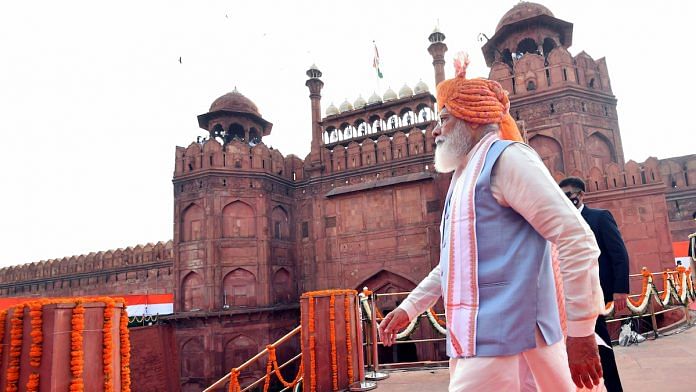New Delhi: To mark the 400th Parkash Purab (birth anniversary) of Guru Tegh Bahadur, the ninth Guru of the Sikhs, Prime Minister Narendra Modi will address the nation around 9.15 pm Thursday from the Red Fort in Delhi — the very place from where the Mughal emperor Aurangzeb ordered the Guru’s execution in 1675.
According to sources in the BJP, following the party’s rout in the Punjab assembly polls, the prime minister intends to build bridges with the Sikhs — who had massive participation in the farmers’ protests, which some BJP leaders branded “Khalistani”. He also plans to send a message against “religious fanaticism”, with an eye on Jammu and Kashmir, which he’ll visit on 24 April, they said.
The PM also has a global perspective in mind, the sources added, to showcase the country’s treatment of minority communities at a time when British Prime Minister Boris Johnson is visiting India. Modi himself is likely to visit Europe next month. This comes at a time when multiple incidents of violence between Hindus and Muslims have broken out across the country.
It’s the second time Modi is breaking from tradition — prime ministers normally address the nation from the Red Fort only on Independence Day. The first time, in October 2018, Modi hoisted the Tricolour at the fort to mark the 75th anniversary of Subhas Chandra Bose’s Azad Hind government. He’ll also be speaking from the Red Fort’s lawn, and not the ramparts as is traditional.
Also read: Sikh clergy, scholars reject Modi’s Veer Baal Diwas — ‘10th Guru’s sons weren’t just brave kids’
Punjab politics & healing Sikh wounds
Modi’s speech comes in the wake of the BJP’s rout in the Punjab assembly election, which was held in February with the results announced on 10 March. Despite an alliance with former Punjab CM Amarinder Singh, the party secured just two seats out of the 73 it contested, with the Aam Aadmi Party (AAP) winning the election.
Party insiders said it was vital to repair the BJP’s ruptured relationship with Punjab ahead of the 2024 Lok Sabha election. And with Punjab being a border state, it’s important to keep the Sikh community happy for strategic reasons as well as for domestic politics, they said.
The party has already made several moves with these considerations in mind. On 1 April, it sent Union minister Gajendra Singh Shekhawat to attend an event in memory of the late firebrand Sikh leader and Shiromani Gurdwara Parbandhak Committee (SGPC) president Gurcharan Singh Tohra on his death anniversary at his native village.
The BJP had inducted Tohra’s grandson in January and made him its candidate in the Amloh constituency during the assembly election (which the AAP candidate won comfortably). Sarchand Singh Bhangu, spokesperson of the Sikh seminary Damdami Taksal, also joined the party in January.
Other moves include Modi announcing the withdrawal of the three controversial farm laws — against which vast numbers of Sikh farmers had protested for a year — on the Parkash Purab of Guru Nanak, the founder of Sikhism, in November last year. Earlier that month, the Kartarpur Corridor, connecting the Gurudwara Darbar Sahib in Pakistan — believed to be Guru Nanak’s final resting place — to India was opened.
In October, three saroops (physical copies) of the Guru Granth Sahib — considered a living Guru by the community — were also evacuated to India from Afghanistan on an Indian Air Force (IAF) fighter jet following the Taliban takeover of Kabul, with Union minister Hardeep Singh Puri seen carrying one on his head.
However, experts say the BJP’s attempts to strengthen its ties with the Sikhs, and the Rashtriya Swayamsevak Sangh’s (RSS) Sikh Sangat affiliate, are viewed with suspicion within the community — it’s seen as part of an agenda to assimilate Sikhism into the Hindu fold.
The SGPC publicly criticised such efforts in 2018, objecting to a Nagpur-based publisher’s characterisation of Sikh Gurus as ‘gau bhakts (cow devotees)’ and Hindus.
Significance of Guru Tegh Bahadur
Political analysts see the move to commemorate Guru Tegh Bahadur, who struggled against forced conversion, as an astute one.
Speaking to ThePrint, Ashutosh Kumar, professor and chairperson of the department of political studies at Panjab University, said, “The main thrust is on reestablishing lost ground and healing the Sikhs’ wounds. And since Guru Tegh Bahadur made a sacrifice for the Hindu community, it is a smart move for the BJP to touch the Sikh community through his life.”
BJP leaders have emphasised the Guru’s fight for religious freedom, with particular reference to Hindus. Home Minister Amit Shah said Wednesday, “Guru Tegh Bahadur sacrificed himself to protect the Hindu dharma. When Kashmiri Pandits narrated to him about the atrocities being committed on them by the Mughals, he said, go and tell Aurangzeb, after they convert me, they can convert others.”
Announcing Modi’s speech, Union minister G. Kishan Reddy had spoken on similar lines Monday, saying that Guru Tegh Bahadur had stood up to the “atrocities” of the Mughals by protecting the freedom of followers of “dharmic” faiths, such as Sikhs and Hindus.
Iqbal Singh Lalpura, chairman of the National Commission for Minorities and a former IPS officer, said, “Guru Tegh Bahadur’s life was a crusade against religious fanaticism. It is more relevant today when conversion and religious fanaticism are trying to disturb the unity and peace of the country.”
Referring to the Guru’s struggle against attempts to convert Kashmiri Hindus to Islam, Lalpura added, “There is no other example in history of such sacrifice to protect another religion.”
(Edited by Rohan Manoj)
Also read: How RSS helped save ‘Darbar Sahib’ twice and upheld Hindu-Sikh unity



